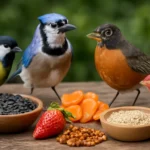Maintaining your bird’s energy levels isn’t just about feeding them frequently—it’s about feeding them right. A well-balanced diet supports vitality, longevity, and even mood in pet birds. So, what do birds eat to stay energetic and healthy throughout their lives?
In this detailed guide, we’ll explore the ideal birds food choices recommended by avian veterinarians and nutrition experts. Whether you’re caring for parrots, parakeets, cockatiels, or canaries, understanding their dietary needs is essential for keeping them chirpy and full of life.
Why Bird Nutrition Matters
Like humans, birds need a diet rich in essential nutrients, including proteins, healthy fats, carbohydrates, vitamins, and minerals. Poor nutrition can lead to lethargy, feather plucking, weakened immune systems, and even life-threatening health problems.
Avian experts emphasize that pet bird food should be species-specific, varied, and formulated to mimic what a bird would naturally eat in the wild.
What Do Birds Eat to Stay Energetic?
The answer to what do birds eat varies by species, but several core food groups help boost energy and support vibrant health:
1. Pellets: The Balanced Base
High-quality pellets make up 60-80% of a healthy bird’s diet. They are fortified with the nutrients birds often lack in seed-only diets. Look for organic or veterinarian-approved options free from artificial dyes and preservatives.
✅ Tip: Choose pellets based on your bird’s species. Large parrots, for example, have different nutritional needs than finches.
2. Fresh Fruits and Vegetables
Colorful fruits and leafy greens supply natural sugars, antioxidants, and hydration. Birds love:
- Apples (seedless)
- Blueberries
- Mangoes
- Spinach
- Carrots
- Kale
These add variety and excitement to your bird’s meals while supplying much-needed vitamins like A, C, and K.
3. Seeds and Nuts – In Moderation
Though seeds and nuts are calorie-dense and loved by most birds, they should be fed sparingly—especially to sedentary birds. However, active or breeding birds may benefit from extra fat and protein.
Almonds, walnuts, sunflower seeds (unsalted), and pumpkin seeds are excellent high-energy treats when offered in small amounts.
4. Proteins and Grains
Hard-boiled eggs (in moderation), cooked legumes, quinoa, and brown rice provide sustained energy and support muscle development. Protein becomes especially important during molting or recovery from illness.
5. Calcium-Rich Foods
Birds need calcium for bone health, egg-laying, and nerve function. Offer sources like:
- Cuttlebone
- Kale
- Broccoli
- Calcium-fortified pellets
Hydration: The Overlooked Energy Booster
While focusing on birds food, don’t forget clean, fresh water. Dehydration can quickly sap a bird’s energy and cause health issues. Always change water daily and ensure it’s not contaminated with droppings or food particles.
Foods to Avoid
Knowing what do birds eat is as important as knowing what they shouldn’t. Toxic foods to avoid include:
- Avocado
- Chocolate
- Caffeine
- Alcohol
- Onion and garlic
- Salted or sugary snacks
How Often Should Birds Be Fed?
Birds thrive on a consistent feeding routine. Most pet birds benefit from two meals a day—morning and evening. Place a small portion of pet bird food in a clean dish and remove uneaten fresh produce after a couple of hours to avoid spoilage.
Behavioral Signs of a Good Diet
A well-fed bird will exhibit:
- Bright, clear eyes
- Glossy feathers
- Active vocalizations
- Regular, healthy droppings
- High energy and curiosity
If your bird is lethargic or showing disinterest in food, consult an avian vet immediately.
External Expert Tip:
If you’re still unsure what do birds eat in your specific climate or environment, consult local avian experts or check species-specific bird diet guides online. This is especially important if you’re introducing new birds to your aviary or adopting a pet bird for the first time.
Final Thoughts
Keeping your bird energetic is all about feeding a diet that mimics nature, includes a wide range of nutrients, and excludes harmful items. Understanding what do birds eat is essential for anyone looking to support their pet bird’s well-being and vitality.
Remember, a happy bird is an active, well-fed bird—and choosing the right birds food can make all the difference.
FAQs
Q1. Can I feed my bird table scraps?
It’s best to avoid most human food unless it’s plain fruits or vegetables. Table scraps often contain salt, oil, and spices that can harm your bird.
Q2. Are all bird seeds bad for pet birds?
Not necessarily, but seeds should be part of a varied diet rather than the main component. Relying solely on seeds can cause nutritional deficiencies.
Q3. How can I get my bird to eat vegetables?
Introduce veggies gradually and try offering them in different textures—chopped, grated, or blended. Birds are more likely to try new foods if they see you “eating” them too.
Q4. Is it okay to feed birds cooked food?
Yes, but only plain and unsalted versions. Cooked quinoa, lentils, and rice can be good protein sources.
Q5. What’s the best pet bird food brand for energy?
Look for brands that are veterinarian-formulated and rich in natural ingredients. Read the label for key nutrients and avoid additives.

